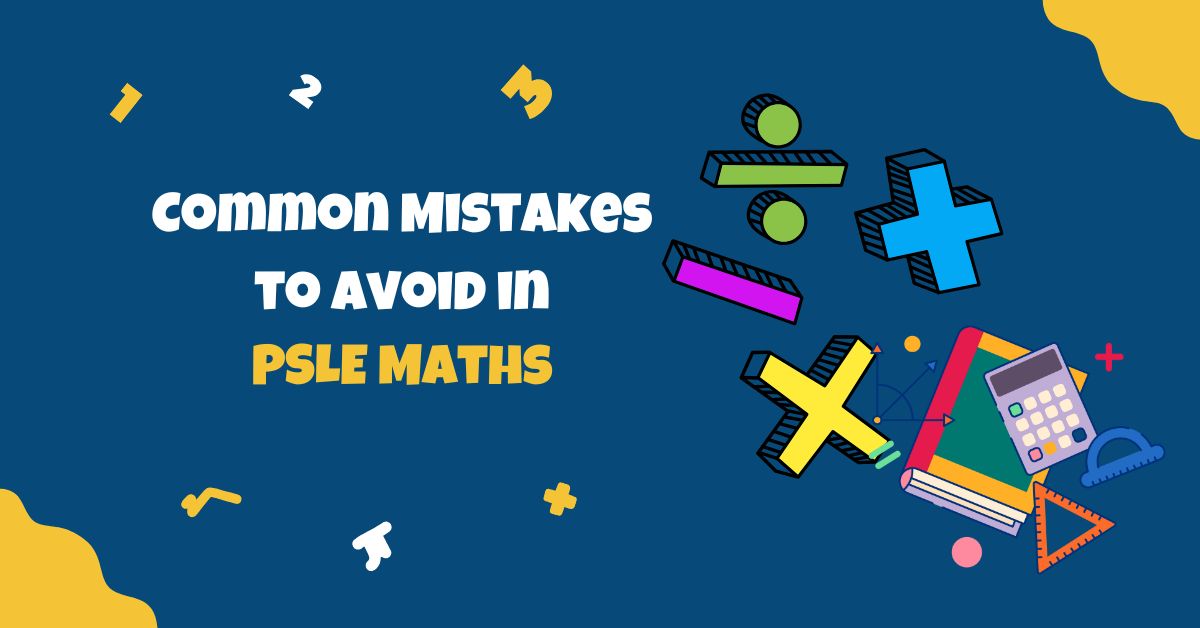The PSLE (Primary School Leaving Examination) is a crucial milestone for students in Singapore, and Mathematics is often one of the most challenging subjects. While many students prepare diligently, they still lose valuable marks due to avoidable mistakes. Understanding these common pitfalls and knowing how to steer clear of them can significantly improve performance.
In this blog, we’ll explore the most common mistakes made in PSLE Maths, why they happen, and practical tips to help your child avoid them.
1. Misreading the Question
Why It Happens:
Many students are eager to solve problems quickly and may rush through the reading process. In doing so, they overlook keywords like “difference,” “total,” or “remaining.”
Example:
If a question asks, “What is the difference between the number of apples and oranges?”, a student might mistakenly add instead of subtracting.
How to Avoid:
- Teach your child to highlight or underline keywords in every question.
- Encourage them to re-read the question at least once before solving.
- Practice comprehension-based math problems regularly.
2. Poor Time Management
Why It Happens:
Students may spend too much time on difficult questions, leaving insufficient time for the rest of the paper.
How to Avoid:
- Allocate time per question during mock exams.
- Encourage the “skip and return” strategy – move on if stuck and revisit the question later.
- Build speed and accuracy through timed practice papers.
3. Careless Calculation Errors
Why It Happens:
Errors in basic operations like addition, subtraction, multiplication, or division often stem from a lack of checking or writing sloppily.
Example:
Multiplying 37 by 4 but writing down 117 instead of 148.
How to Avoid:
- Always double-check answers if time permits.
- Encourage neat working and column alignment.
- Use estimation techniques to quickly verify if an answer is reasonable.
4. Forgetting Units or Giving Incorrect Units
Why It Happens:
After solving a question correctly, students may forget to include the unit (e.g., cm, ml, kg) in their final answer.
How to Avoid:
- Remind students to circle or box their final answer and ensure units are included.
- Drill with questions where marks are awarded for correct units.
5. Not Showing Working Clearly
Why It Happens:
Some students skip steps or do all calculations mentally. If a mistake is made, it becomes hard to trace back and correct.
Why It Matters:
The PSLE Maths marking scheme awards method marks. Showing proper working could still earn partial marks even if the final answer is incorrect.
How to Avoid:
- Train students to write out all steps clearly, even for simple problems.
- Use lined or squared paper to organise thoughts better.
- Practice past year papers using full-length answers and workings.
6. Confusing Mathematical Concepts
Why It Happens:
Students often mix up similar topics, such as:
- Area vs. Perimeter
- Volume vs. Surface Area
- Fractions vs. Ratios
How to Avoid:
- Create visual aids (e.g., charts, diagrams) to explain differences.
- Use real-life examples to reinforce concepts.
- Practice topic-specific questions to strengthen conceptual clarity.
7. Leaving Questions Blank
Why It Happens:
Students may lack confidence or believe they cannot solve a question at all.
Why It’s a Problem:
Blank answers guarantee zero marks. Even attempting can earn partial credit.
How to Avoid:
- Encourage students to attempt every question, even with an educated guess.
- Practice confidence-building exercises and mock papers.
8. Weak in Problem-Solving Techniques
Why It Happens:
PSLE Maths is not just about formulas but also applications. Some students struggle to apply concepts to word problems.
How to Avoid:
- Teach heuristics like drawing a model, guess and check, or working backwards.
- Break down complex problems into smaller, manageable parts.
- Use PSLE Maths composition-type questions that require logical thinking and step-by-step reasoning.
9. Over-Reliance on Memorisation
Why It Happens:
Some students try to memorise formulas or solutions without truly understanding them.
Why It’s a Problem:
When the question is worded differently, they get confused.
How to Avoid:
- Focus on conceptual understanding, not rote learning.
- Use hands-on activities and visuals to explain abstract concepts.
- Encourage children to explain concepts in their own words.
10. Not Reviewing Mistakes
Why It Happens:
After completing worksheets or exams, students may proceed without reviewing their errors.
How to Avoid:
- Make it a habit to review incorrect answers and understand why the mistake occurred.
- Maintain an “Error Journal” – a simple notebook where your child writes down mistakes and corrections.
Final Words
Mastering PSLE Maths requires more than just practice – it involves strategic learning, careful review, and the development of strong problem-solving skills. By identifying and avoiding these common mistakes, students can build confidence and significantly improve their results.
At Explico, we understand the challenges that PSLE students face. Our AI-powered learning platform and experienced educators provide tailored support to help every child excel in Maths. From error analysis to concept reinforcement, we’re here to guide your child toward PSLE success.
H2: Ready to Help Your Child Succeed?
Explore Explico’s PSLE Maths tuition programmes and experience personalised learning designed to fix mistakes before they become habits.


